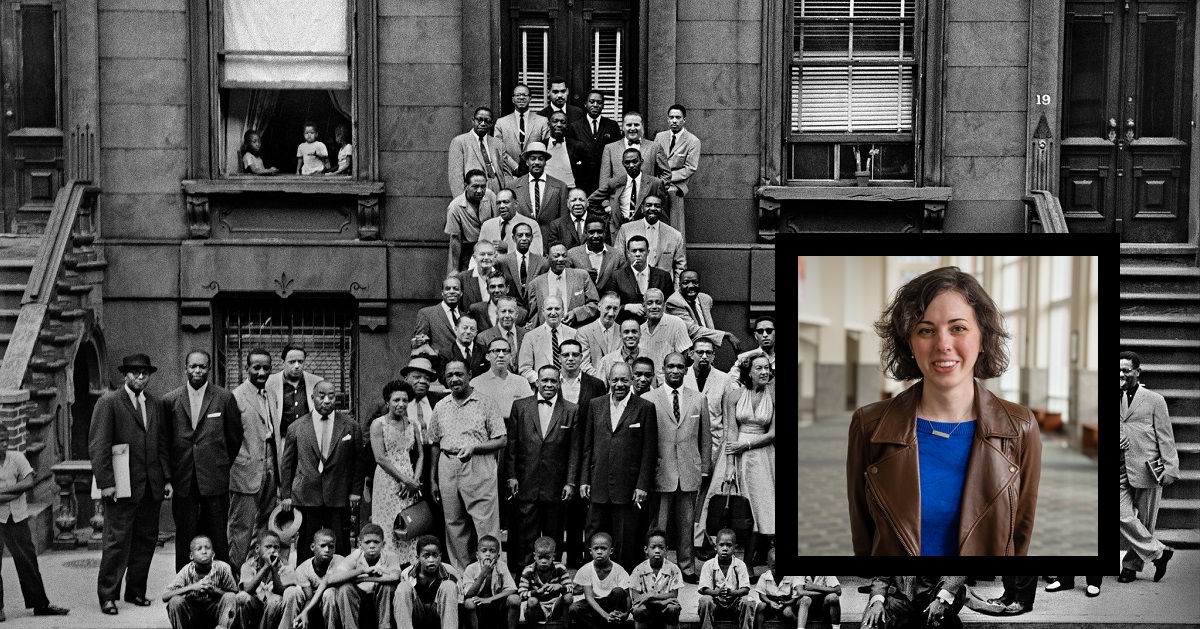
Dr. Kelsey Klotz, on Brubeck, Brahms & 1959
September 2020 — This month, we welcome our newest faculty member, Dr. Kelsey Klotz, who will be leading the Jazz Appreciation online workshop. Dr. Klotz is a lecturer in UNC Charlotte’s Department of Art & Art History, a postdoctoral fellow at Emory University a PhD in Musicology with a Bachelor of Arts degree in Music, with a piano concentration. We caught up to Kelsey to talk about her background and her choice of topic for this class.
Your background seems to be an amazing mix of music and history. Which interest came first, and how did you first see the path to intermingle them?
I grew up with jazz. In undergraduate, I was studying piano and planning to be a Band Director. Along the way, I took a course in music and religious thought. After writing my paper on Brahms, the instructor took me aside and offered “Did you know there is a career where you could do that?”
I pursued my PhD, initially focused on the classical genre. In that program, I discovered that, while it seemed like everybody had written on Brahms, not everyone has the knowledge base I did for jazz. PhD students getting a degree in music didn’t have the jazz experience. That’s when I really shifted and found my focus.
I’ve heard of biology… and psychology… so what exactly is musicology?
The literal definition is the study of music, in the broadest sense, distinguishing it from music performance.
Different people will take different approaches, such as an analysis of a piece of music, connecting the style to other songs or musicians. The approach I take is more social cultural historical. I look at what a song means in that time, where it was performed, how different people heard it.
Tell me a little about how music and society intertwine, in your view?
Funny you ask that. My class at UNC Charlotte currently is Arts and Society. The thing to remember is that musicians are individuals within a society experiencing the same things we or their audience are experiencing. They just have a different expressive form they can use. So that means sometimes their music is going to be deeply and obviously informed by that relationship and we can easily see it. With The clearest place you can see it is protest music. Sometimes it’s not going to be quite as obvious. You can look at what decisions the artist is making and how does that relate to what they’ve done in the past, looking backward, forward and sideways at what’s happening. That might relate today to the use of technology, or lack of it, to express a reaction to this distinct moment in time.
I understand you are evolving your PhD dissertation into a book about Dave Brubeck. Talk a little about some of your research and discoveries.
In my original studies of the cool jazz movement, Brubeck stood out in the way race played into how he was received by critics and how he was marketed. In the early 1950s, as he was gaining fame, his music was described as intellectual. He was talked about in terms of European classical music like Bach, identifying fugues and counterpoint. In striking comparison, other black musicians like John Lewis and the Modern Jazz Quartet are not described in those terms, even though in Lewis’ music you can find direct quotes from Bach and much more strict fugue structure.
At the same time, Brubeck sees segregation impacting his fellow bandmate’s experiences. We see this white artist trying to become an activist and yet manage a mainstream career. He’s not always successful. My approach is informed by the fact that I lived in St Louis during the Ferguson uprising. I think Dave Brubeck can teach us quite a bit, as we currently try to figure out how to be engaged, how to be vocal and how to educate ourselves.
Of all the possibilities for this first jazz appreciation course with JazzArts Charlotte, talk about the choice to start with 1959.
This year fascinates me and a lot of people. You have all of these important releases, all doing such different things. Jazz followers often get caught up in the question “what is jazz”. Looking at this one year, you really get a sense of the multiplicity of approaches to that question. You have Miles Davis doing this modal chill cool thing. You have Dave Brubeck’s approach to rhythm. Charles Mingus, rooted in jazz tradition, presents new paths forward for composition. All happening at the same time. It’s fascinating, then, that so many became popular.
Each day of the class will focus on a different album to discover these different jazz styles. We’ll uncover some footholds to what you’re hearing in the music and what it is doing. We can narrow down with the artist, the album, and even individual tracks.
Some of the online features are really cool, offering a setting that encourages participation, especially where individuals have different levels of knowledge. I encourage participants to use the chat feature to have side conversations, like passing notes in class. We will use breakout sessions to give everyone a chance to respond to what they are hearing. It’s a great place to share your own thoughts, and even ask questions you might normally be too shy to share.
My final question goes back to your musical roots. How much do you still play piano?
Before moving from St Louis to Charlotte, I played at my church and a little around town. Less since then. I do occasionally work up my Brubeck repertoire for a performance lecture. Mainly, it’s for relaxation now.
Dr. Kelsey Klotz will be leading our exciting new online workshop, “Jazz Appreciation: the Year 1959”. Registration is open through September 21 and the 8-weekly sessions begin September 28. To learn more about this, or any of our Fall adult and youth programs, visit www.thejazzarts.org/education